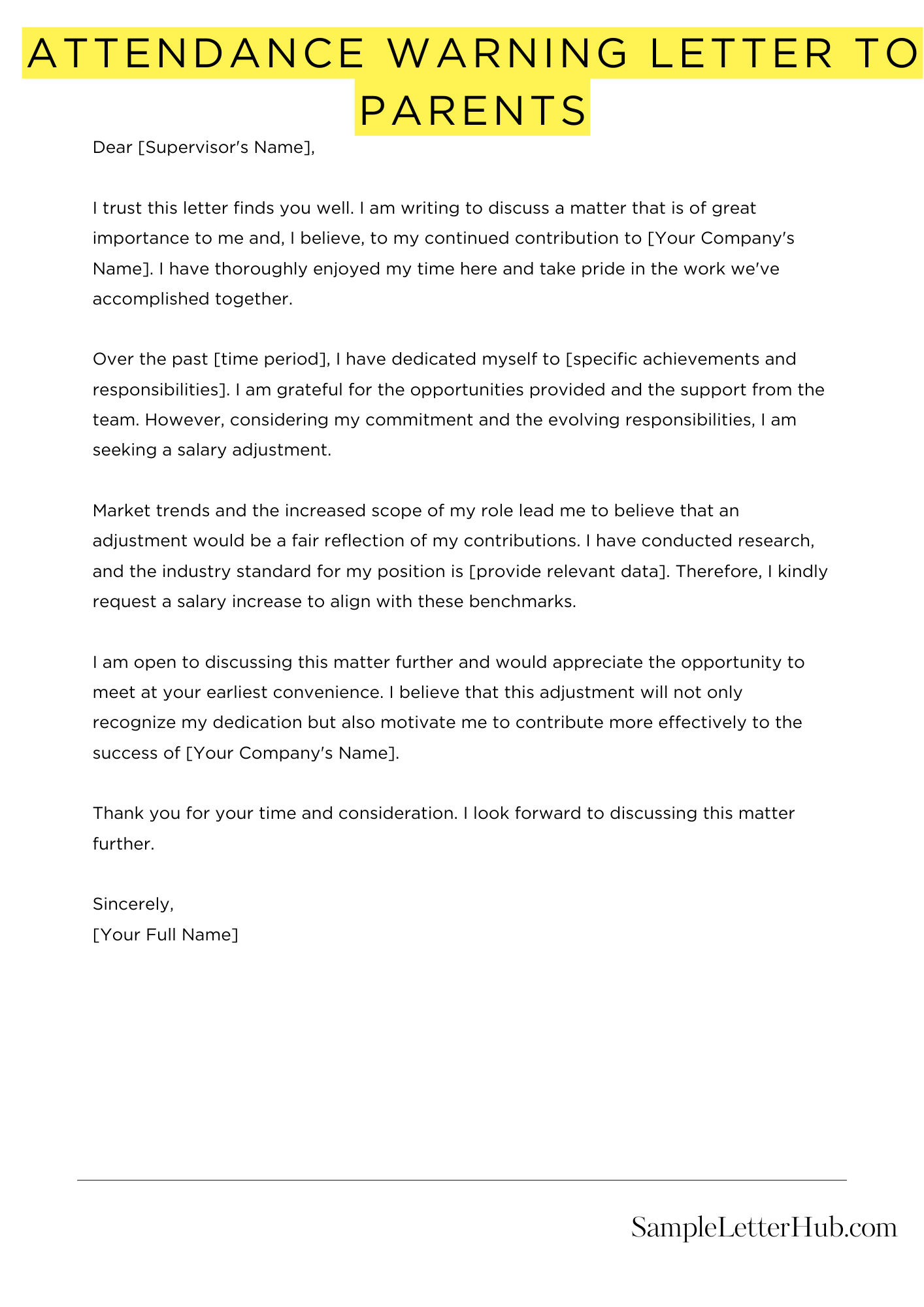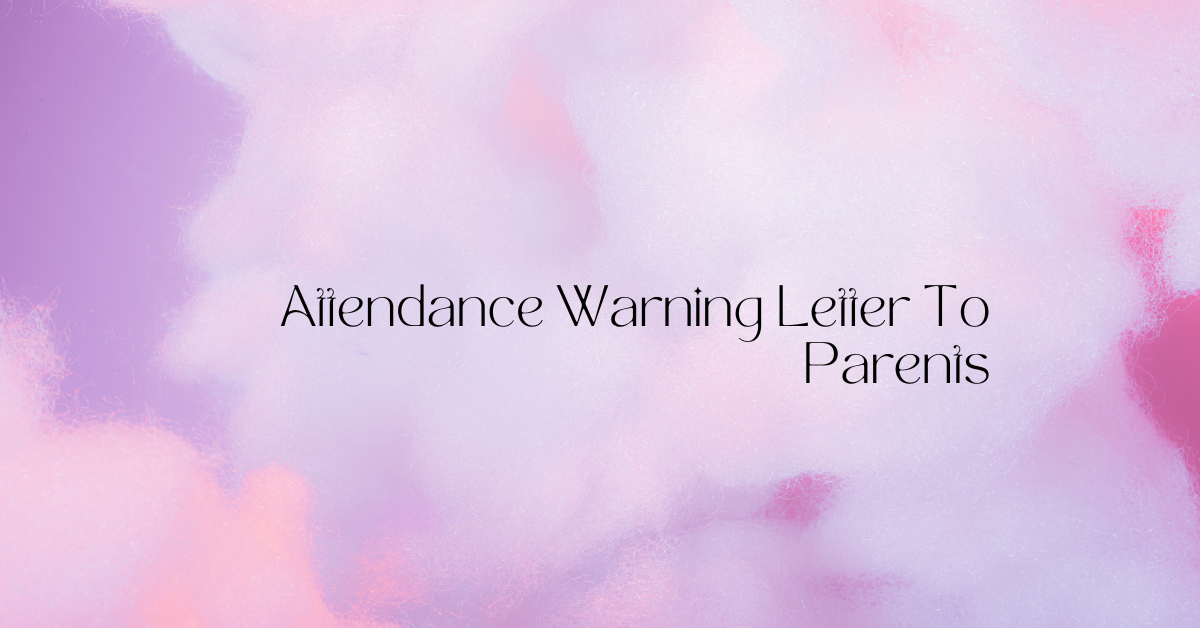An attendance warning letter to parents is a formal notice sent by a school to the parents of a student who has been absent from school excessively. The purpose of the letter is to inform the parents of their child’s attendance record and to warn them that further absences may result in disciplinary action.
In this article, we will share several templates, examples, and samples of attendance warning letters to parents. These letters can be used as a starting point for writing your own letter. We will also provide tips on how to write an effective attendance warning letter.
Attendance Warning Letter To Parents
Dear Mr. and Mrs. [Parents’ Last Name],
We are writing to express our concern about [Student’s Name]’s recent attendance record. [Student’s Name] has missed [Number] days of school this semester, which is [Percentage]% of the total school days.
Regular attendance is essential for students to succeed in school. When students miss school, they miss out on important lessons and assignments. They also fall behind their classmates and may have difficulty catching up.
We understand that there may be occasional circumstances that prevent students from attending school. However, [Student’s Name]’s absences have become a pattern. We are concerned that this pattern will continue and that [Student’s Name] will fall behind in their studies.
We urge you to take steps to ensure that [Student’s Name] attends school regularly. This may include setting regular bedtimes, making sure [Student’s Name] gets enough sleep, and providing transportation to and from school.
If [Student’s Name]’s attendance does not improve, we may have to take further action, such as referring [Student’s Name] to the truancy officer.
We want to work with you to help [Student’s Name] succeed in school. Please contact us if you have any questions or concerns.
Sincerely,
[Your Name]

How to Write a Warning Letter to Parents
A warning letter to parents is a formal document that expresses concern about a child’s behavior or academic performance. It is typically sent by a teacher or school administrator to the parents of the child in question.
Purpose of a Warning Letter
The purpose of a warning letter is to:
- Inform the parents of the child’s concerning behavior or academic performance.
- Provide the parents with specific examples of the child’s behavior or academic performance that is causing concern.
- Request that the parents take action to address the child’s behavior or academic performance.
- Warn the parents that if the child’s behavior or academic performance does not improve, further action may be taken, such as suspension or expulsion.
Content of a Warning Letter
A warning letter to parents should include the following information:
- The child’s name and grade.
- The date of the letter.
- The name of the teacher or school administrator who is writing the letter.
- A clear and concise statement of the child’s concerning behavior or academic performance.
- Specific examples of the child’s behavior or academic performance that is causing concern.
- A request that the parents take action to address the child’s behavior or academic performance.
- A warning that if the child’s behavior or academic performance does not improve, further action may be taken.
Tone of a Warning Letter
The tone of a warning letter should be professional, respectful, and firm. It is important to avoid using accusatory or judgmental language. The goal of the letter is to inform the parents of the child’s concerning behavior or academic performance and to request that they take action to address the issue.
Follow-Up to a Warning Letter
After sending a warning letter to parents, it is important to follow up with them to see if they have taken action to address the child’s behavior or academic performance. If the parents have not taken action, it may be necessary to take further action, such as suspension or expulsion.
Sample Warning Letter
Dear Mr. and Mrs. Smith,
I am writing to express my concern about your son, John’s, behavior in my fifth grade class. John has been exhibiting a pattern of disruptive behavior that is interfering with his learning and the learning of his classmates.
Specifically, John has been talking out of turn, interrupting others, and refusing to follow instructions. He has also been disrespectful to me and to his classmates.
I have spoken to John about his behavior on several occasions, but he has not shown any improvement. I am concerned that if John’s behavior does not improve, he may be at risk of failing this grade.
I request that you take action to address John’s behavior. I suggest that you talk to John about his behavior and set clear expectations for him. You may also want to consider seeking professional help from a counselor or therapist.
If John’s behavior does not improve, I may be forced to take further action, such as suspension or expulsion.
Thank you for your time and attention to this matter.
Sincerely,
Ms. Jones
FAQs about Attendance Warning Letter To Parents
What is an attendance warning letter to parents?
An attendance warning letter to parents is a formal letter sent by a school to the parents of a student who has been absent from school for an excessive number of days. The letter typically outlines the student’s attendance record, the school’s attendance policy, and the consequences of further absences.
When should a school send an attendance warning letter to parents?
A school should send an attendance warning letter to parents when a student has been absent from school for a number of days that exceeds the school’s attendance policy. The number of days that trigger a warning letter may vary from school to school, but it is typically around 5-10 days.
What should an attendance warning letter to parents include?
An attendance warning letter to parents should include the following information:
- The student’s name and grade
- The student’s attendance record
- The school’s attendance policy
- The consequences of further absences
- A request for the parents to contact the school to discuss the student’s attendance
What are the consequences of ignoring an attendance warning letter?
The consequences of ignoring an attendance warning letter may vary from school to school, but they may include:
- Additional warning letters
- Detention
- Suspension
- Expulsion
What can parents do to improve their child’s attendance?
There are a number of things that parents can do to improve their child’s attendance, including:
- Talking to their child about the importance of attendance
- Setting regular bedtimes and wake-up times
- Making sure their child has everything they need for school, such as clothes, supplies, and transportation
- Contacting the school if their child is going to be absent
- Working with the school to develop a plan to improve their child’s attendance

